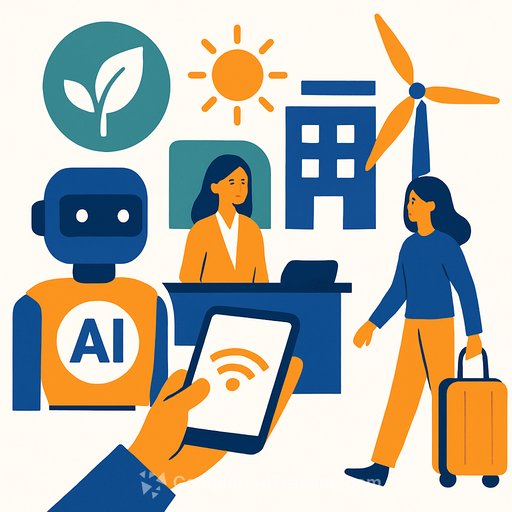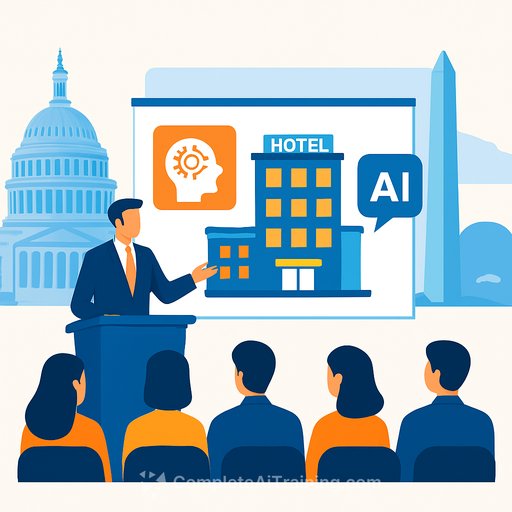AI Takes Center Stage in Guest Personalization
Artificial intelligence has become a key element in enhancing guest experiences within hospitality. Hotels and resorts are using AI-powered tools to personalize services by analyzing guest data in real time. This allows for adjustments such as optimal room temperature and customized dining suggestions before guests even arrive.
This level of personalization goes beyond convenience; it helps build loyalty in a competitive market where travelers expect smooth and intuitive interactions. Predictive analytics also assist properties in anticipating guest needs and optimizing staff allocation.
Industry reports highlight how AI combined with IoT is transforming operations, improving energy management, and strengthening guest safety measures. Additionally, integrating sustainability features with AI helps hotels reduce waste and appeal to environmentally conscious travelers, blending innovation with responsibility.
Sustainability Through Smart Tech Innovations
Sustainability is becoming a core focus supported by technologies that reduce environmental impact. Smart sensors and IoT devices monitor energy use, water consumption, and food waste in real time. Hotels adopting these tools achieve green certifications, cutting costs while attracting eco-aware guests.
Tech-driven sustainability is turning operational challenges into competitive strengths. For example, AI platforms optimize supply chains by favoring local, low-carbon suppliers. This approach is especially useful for urban hotels managing limited space and resources efficiently.
Contactless Solutions Redefine Check-In and Beyond
Contactless technologies have moved from pandemic responses to standard practice. Mobile apps and facial recognition now streamline check-in and room access, cutting wait times and boosting security. Digital payments and virtual concierges allow guests to book services through voice commands without staff interaction.
These innovations improve efficiency in busy locations such as airports and convention centers. In-hotel restaurants increasingly use QR code menus and automated ordering, combining convenience with data-driven menu improvements.
Wellness and Bleisure Travel Drive Tech Integration
Health-focused technology is gaining traction as travelers seek comprehensive wellness experiences. Wearable integrations and health-tracking apps enable hotels to offer personalized wellness programs, including guided meditations and fitness routines synced to room amenities.
The rise of bleisure travel—combining business and leisure—means professionals want technology that supports both work and relaxation. AI enables flexible spaces that transform from meeting rooms into spa areas, meeting the needs of corporate clients who value integrated wellness options.
Blockchain and Data Security in Hospitality
With data central to personalized services, blockchain technology ensures security and transparency. It supports secure booking ledgers and tokenized loyalty programs, reducing fraud and building guest trust.
Hotels explore blockchain to protect sensitive information and enable seamless data sharing with partners like airlines and tour operators. As cyber threats increase, properties invest in these systems to safeguard data. Blockchain also opens new revenue channels, such as NFT-based exclusive experiences.
Automation Enhances Back-of-House Operations
Automation is improving back-of-house functions like inventory management and housekeeping schedules. Robots handle routine tasks, freeing staff to focus on guest-facing roles and easing labor shortages. AI forecasts maintenance needs to avoid downtime and keep operations running smoothly.
In food and beverage, automated kitchens and delivery robots speed up service and improve accuracy, directly influencing guest satisfaction.
Global Conferences Spotlight Future Innovations
Recent industry events highlight these trends. The HFTP CIO Summit 2025 in Vancouver focuses on new technology for hospitality leaders, while HOTELEX Shanghai 2026 previews innovations emphasizing AI and sustainability. Social media discussions reflect excitement around AI chatbots and virtual reality events shaping the near future.
One common concern is connectivity quality, prompting venues to invest in better network infrastructure to ensure seamless experiences.
Market Growth and Economic Implications
The hotel and hospitality management software market is expected to reach $10.55 billion by 2030, driven largely by AI-powered personalization. This growth signals increasing reliance on smart technologies to meet guest expectations and streamline operations.
For those in hospitality and events, understanding these advancements is essential to stay competitive and deliver exceptional experiences.
Your membership also unlocks:






